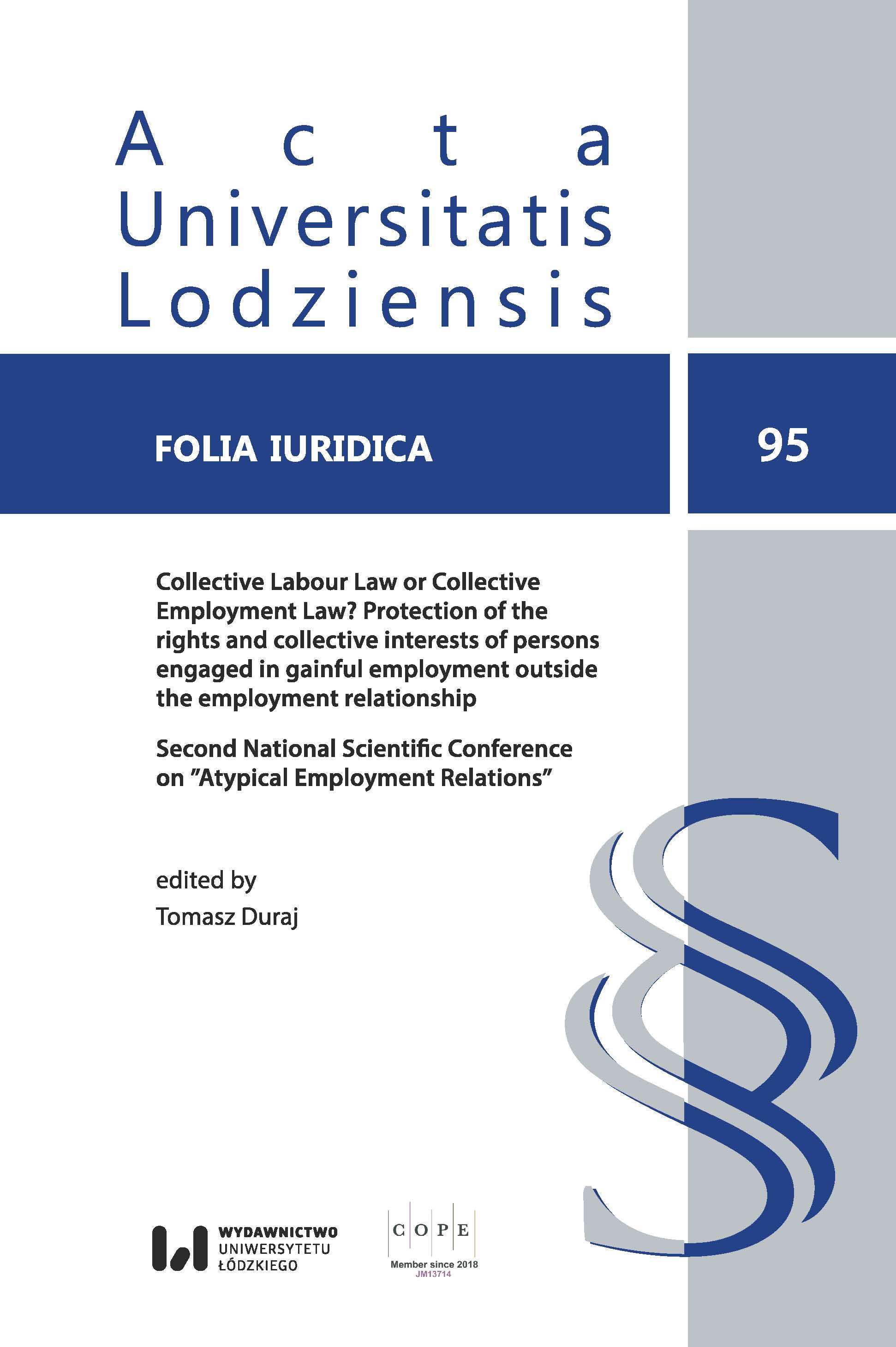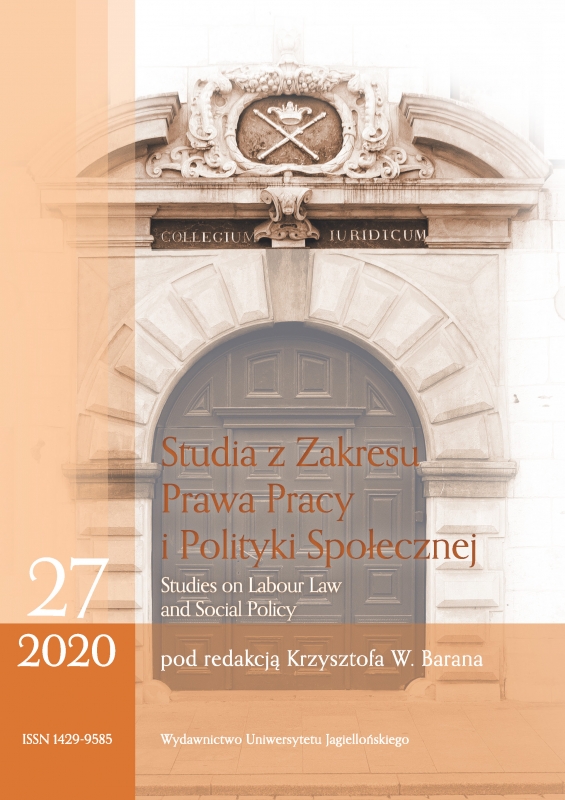
We kindly inform you that, as long as the subject affiliation of our 300.000+ articles is in progress, you might get unsufficient or no results on your third level or second level search. In this case, please broaden your search criteria.


This obligation was added to and enriched with the amendments in the Labour Code, which took place in March 2001. It is an obligation of the employer to the particular employee, to the representatives of the employees, elected by the General Assembly pursuant to Art. 7, para. 2 of the Labour Code and to the trade union organisations. Its essence is as follows: a) giving information to the particular employee about the economic and financial status of the employer, which is important for his/her labour rights and obligations, as well as when his/her labour relation is amended; b) giving information and consulting with the representatives of the employees when introducing overtime or part time, also in cases of mass reductions of staff; c) giving information to the trade union organisations about the economic and financial status of the enterprise during the negotiations for concluding of collective contracts of employment.
More...
This survey is devoted to the National Framework Contract (NFC) as a source of the Social insurance law. This contract regulates the details of the medical assistance to which the insured persons have a right according to the Health Insurance Act. Parties, contents, form and other characteristics of this act are surveyed. This act is treated as a normative agreement. On the basis of the critical analysis of the legislation in force and on the experience of conclusion of NFC for 2000, 2001 and 2002 proposals de lege ferenda are offered in the article too.
More...


The article highlights the amendments to the Labour Code and the Law on the Settlement of Collective Labour Disputes, adopted in March 2001, which developed further the collective labour law. The focus is on the new and enriched legal regulation of such fundamental institutes of Bulgarian collective labour law as the social dialogue, tripartite cooperation, collective bargaining and collective agreements, representatives of workers and officers, chosen by the general meeting of workers and officers as well as the role of the mediation, conciliation and arbitration in voluntary settlement of the collective labour disputes.
More...
Extension of working hours over the established normal or reduced duration of the working time was introduced in Bulgarian labour legislation by the Amendments of the Labour Code Act of March 2001. This is possible due to reasons connected to the production process and aims better opportunities for the employers to use effective the working force. Several limitations are established by the law for exercising this right of the employer - maximal duration of the working day; not more than 60 extended working days in a year from which not more than 20 consecutive days etc. The extended duration of working hours has to be compensated by reduction of working time in a period not more than 4 months. The employer should consult the workers representatives and inform the Labour inspection before introducing such a regime of work. These and other topics as well as the experiences of other industrialized countries are surveyed in this article.
More...

The article focuses on the origin of the term ‘working time’ and the stages in the development of its regulation. Consideration is given to those factors which bring about the interference of the State in the private relationships between the employee and the employer through the limitation on the maximum duration of working time. At the very beginning, the legislation regarding the limitation on the duration of working time is adopted in the industrialized countries with respect to some vulnerable groups of employees (e.g. women and children). Later on, working hours limit for all employees is arrived at. Special attention is given to the importance of the international standards that are adopted by the International Labour Organization. The subsequent important stage is the establishment of the 40-hour work week, which is assumed to be the normal duration. The concept of flexibility, which has been dominant since the seventies of the 20th century, and its impact on working time have also been examined. When considering the separate stages, an obvious constant tendency to a decrease in working time duration is observed, although this tendency has its specific manifestation in the various sectors of the economy and the separate regions of the world.
More...
The article deals with the insurer under Bulgarian law. The insurer is a branch-type legal subject because it is only in Bulgarian social security law that he is called ‘insurer’. This thesis partially contravenes Art. 5, para. 1 of the Social Security Code (SSC), yet it is consistent with the Constitution, which is ‘... the supreme law and the other laws may not contravene it ...’ and the norms of which ‘... have a direct effect ...’ (Art. 5, para. 1 and para. 2 Const.). Consideration is given to the insurer that may be either an individual or a legal entity, and arguments in favour thereof are put forward. A comparison is made between the concept of ‘insurer’ and other similar legal figures.
More...
The main objective of the following study is to introduce readers to the issue of the 2nd National Scientific Conference in the series “Atypical Employment Relations” organized on 3 October 2019 by the Centre for Atypical Employment Relations of the University of Lodz. The consequence of extending the right of coalition to persons performing paid work outside the employment relationship was that they were guaranteed important collective rights, which until 1 January 2019 were reserved primarily for employees. The rights which Polish legislator ensured to non-employees include the right to equal treatment in employment due to membership in a trade union or performing trade union functions; the right to bargain with a view to the conclusion of collective agreement and other collective agreements; the right to bargain to resolve collective disputes and the right to organize strikes and other forms of protest, as well as the right to protect union activists. The author positively assesses the extension of collective rights to people engaged in gainful employment outside the employment relationship, noting a number of flaws and shortcomings of the analyzed norms. The manner of regulating this matter, through the mechanism of referring to the relevant provisions regulating the situation of employees, the statutory equalization of the scope of collective rights of non-employees with the situation of employees, the lack of criteria differentiating these rights, as well as the adopted model of trade union representation based on company trade unions, not taking into account the specific situation of people working for profit outside the employment relationship, are the reasons why the amendment to the trade union law is seen critically and requires further changes.
More...
In accordance with the changes in the provisions of the collective labour law in force since January 1, 2019, an employer within their meaning is also an organizational unit without civil law subjectivity, if it employs work contractors engaged in paid work engaged in paid work other than employees. This leads to the dualism of the notion and legal construction of the entity employing non-employee contractors on the basis of individual and collective relations. In individual legal relations, the entity employing contractors on the basis of civil law contracts may only be a civil law entity. On the other hand, in collective labour relations, organizational unit without civil law capacity may be regarded as their employer. The purpose of this study is to give the reasons for the thesis that such regulation leads to legal confusion, and the most appropriate way to remove it is to link the employer’s subjectivity with civil law subjectivity in individual and collective labour law.
More...
From January 1, 2019. Amendments to the Act of July 5, 2018 amending the provisions on trade unions and some other acts apply (almost in full). Amendments to the Polish act are a consequence of the Committee for the Freedom of Association, Labor Law Organizations and the judgment of the Polish Constitutional Tribunal. The main and expected effect of the amendment is the extension of coalition freedom in trade unions. This issue is important not only for the consistency of the legal system with international law, but also for social reasons. Concluding civil law contracts in the place of employee forms of employment is a common practice in Polish conditions. The main problem is that the civil law contract has a purpose other than the employment contract. Contracts of mandate and provision of services are the basis for the implementation of actual and legal activities.Besides, the legislator does not have any real actions aimed at eliminating the defective practice. The text is an attempt to synthetically summarize the motives of the amendment, as well as its effects and tests.
More...
The subject of the deliberations are issues regarding the representativeness and size of workplace trade union organisations after the changes introduced in the Trade Unions Act in 2018. According to the obligatory provisions, the “representativeness” of a trade union organisation is traditionally conditional on its size, but not only the employees, but also other categories of the employed are taken into account. It is, inter alia, about persons providing work under a contract of mandate or a specific work contract and sole proprietors. By expanding the full rights of coalition onto persons performing work on the basis other than employment relationship, the legislator increased the percentage limits decisive in the matter of representativeness. At present, the representative trade union organisation above the workplace level is also an organisation uniting at least 15% of all people performing gainful work under the articles of association, not fewer, however, than 10,000 persons performing gainful work. It works similarly at the workplace level. With reference to workplace trade union organisations which belong to organisations above the workplace level which meet the criteria for representativeness as specified in the Social Dialogue Council Act, at least 8% of the staff of the given employer is required. In the case of workplace trade union organisations which do not participate in such structures, the representativeness is conditional on uniting of at least 15% of persons performing gainful work for the given employer (7% and 10%, respectively, were required earlier). Determining the number of the staff, the employees and persons providing gainful work under other bases being employed for at least 6 months before the commencement of negotiations or arrangements must be included. A significant novelty is the necessity to select a joint representation of the representative organisations at the workplace level that belong to the same Trade Union Federation or National Trade Union Confederation in matters regarding collective rights and interests of the persons performing gainful work.
More...
The article presents the role of the staff representation under the Act of 4 October 2018 on Employee Capital Plans. Employee Capital Plans (PPK) are the part of third pillar of polish pension system. By creating the PPK, the legislature placed the staff representation and the employer under an obligation to co-decide on the form of the created capital plan. The method of identifying the staff representation, as defined in the Act on Employee Capital Plans, is modelled on the regulation contained in the Act on Occupational Pension Schemes. The Act on Employee Capital Plans states, that an occupational trade union organisation operating within the premises of the company excludes the competence of representation of employees. The legitimacy of the primacy of the trade union over the non-union representation of the staff stems, first of all, from the possibility of guaranteeing the employees’ effective participation in the selection of the financial institution.
More...
This paper aims to analyse collective labour rights of both “classic” selfemployed persons and economically dependent self-employed workers under the Spanish Statute of Self-Employed Workers (Ley 20/2007 del Estatuto del Trabajo Autónomo). The author applies comparative analysis and critical reasoning with a view to answering the questions: is the scope of protection wide enough, and can Poland draw a lesson from it? The paper presents evidence that demonstrates that among all self-employed workers, only economically dependent self-employed workers are granted the right to bargain collectively. However, findings suggest that in practice, collective bargaining is stymied mainly because it takes place only at the enterprise level, and because the number of economically dependent self-employed workers is minimal. The paper concludes that collective labour rights under the Statute of Self-Employed Workers could be better protected (especially as regards “classic” self-employed persons). On the other hand, however, in Poland, the lack of any criteria that would enable a diversification of the scope of collective rights granted to self-employed persons is subject to criticism. It appears that in some areas the legislator should differentiate the scope of protection. The criterion of economic dependence, which exists in Spanish law, could be successfully used for this purpose.
More...
According to the Constitution of 1991 and the Health Insurance Act of 1998 a health insurance system has to be introduced in Bulgaria. A lot of legal provisions of the latter act are not typical for the social security systems. The insured income is a basis only for determination of the contributions to the National Health Insurance Funds but this income and the contributions are of no importance for the services due by the Funds. In such a way the contributions are more similar to taxes than to social security contributions. Furthermore the insured person has to pay additional fees — for every visit to a doctor and for every day spent in a hospital. This is another reason for a doubt as to the insurance character of the Bulgarian health insurance system.
More...
This article is devoted to the inter-company trade union organization after the amendment to the Trade Union Act. The inter-company trade union organization is relatively rarely subject of studies in labour law. Usually it is considered that the arrangements made for the company trade union organizations relate also to intercompany trade union organisation. Meanwhile, a more detailed analysis shows that the inter-company trade union organization is characterized by far-reaching specificity, and its regulation based largely on references to regulations governing the legal status of the company trade union organization is not always adequate. This generates numerous practical problems. In this text, the author analyzes several particularly important issues regarding intercompany trade union organization in connection with the amendment to the Trade Union Act, which entered into force on January 1, 2019.
More...
Migration of people is a multidimensional phenomenon that combines various aspects. Complexity of migration processes, its variability in time, diversity of economic, demographic, political or cultural determinants pose considerable challenges on the European labour market on many levels, starting from theoretical ones—related to the adoption of a uniform definition of migrant workers, and ending with the practical ones—relating to the establishment of the sustainable migration policy measures that would aim at safeguarding their fully-fledged participation in it guaranteed by various regulatory norms and standards. The article aims at presenting a rudimentary analysis of the specificity of labour migration in Poland against the background of European countries, in order to elucidate the deficiencies of the present regulatory approaches in addressing the phenomenon of sui generis peripherilization of migrant workforce in Poland. Its content has been enriched with comparative overview of the results of the case studies conducted in one of the key sectors for European labour market exposed to this phenomenon—namely pork meat value chain. Notably, problems related to wage levels and working conditions of migrant workers observed in this sector are as much industry-specific, as exemplary of wider global trends in industries that offer low pay, low status, little career advancement and stressful work environment.
More...
The European Social Charter, the EU Charter of Fundamental Rights and the European Pillar of Social Rights, are tied by mutual interactions and inspirations. The aim of this study is to present the institution of solidarity action, lockout and protection of workers’ elected representatives, and reflection on which instruments of international law can be applied in these areas.
More...